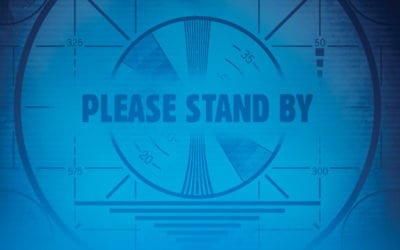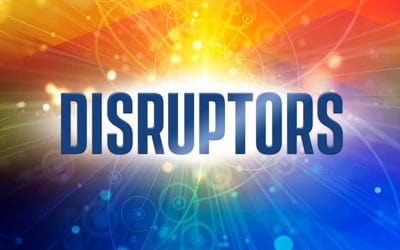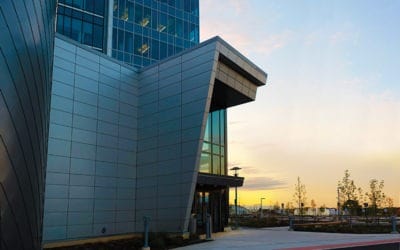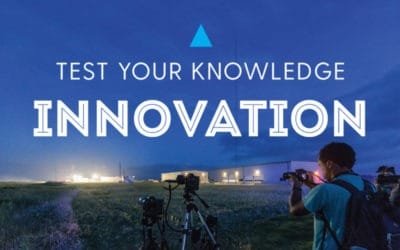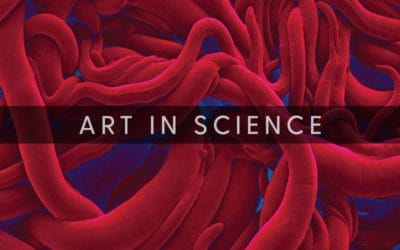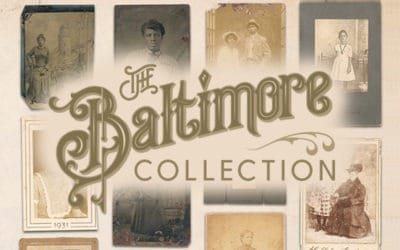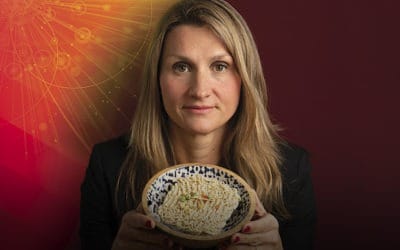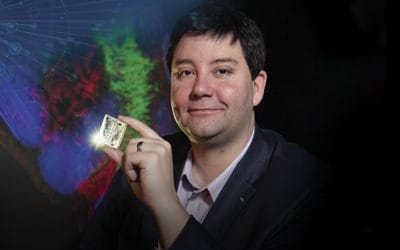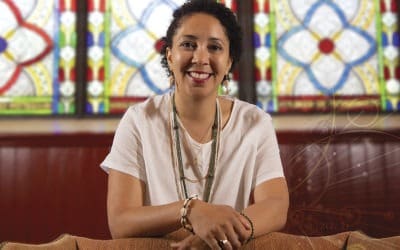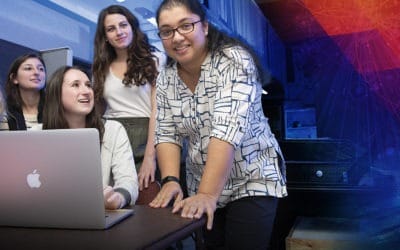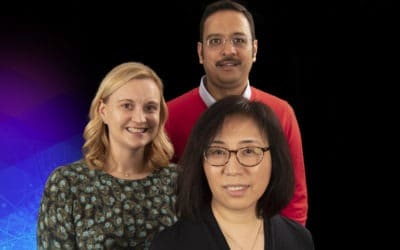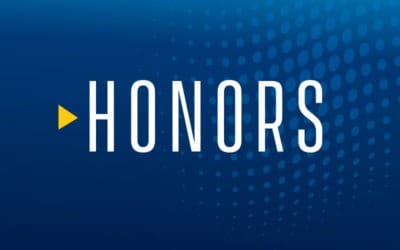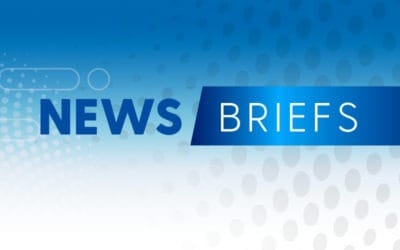
DISRUPTORS
PROBING THE POWER OF PARADOX
Do you think of choices as being either “right or wrong”? Or that you should focus on making a profit in business versus achieving greater sustainability or some other goal? In the face of competing demands, Wendy Smith says we should let go of the old “either/or” way of thinking and embrace “both/and”—what she refers to as “the power of paradox”—to truly unleash creativity and succeed in today’s world.
Smith believes success comes from living in the “AND.” In her research, she is helping leaders to be compassionate and competent, assertive and engaging, committed to family and committed to work.

Wendy Smith
Alfred Lerner College of Business and Economics
MEET WENDY
A professor of management at UD’s Lerner College of Business and Economics, Wendy Smith focuses on how leaders and teams can effectively respond to contradictory agendas. She teaches leadership, organizational behavior and business ethics and is a driving force behind Lerner’s Women’s Leadership Forum. Smith has a doctorate in organizational behavior from Harvard Business School, a master’s in psychology from Harvard, and a bachelor’s degree in psychology and political science from Yale.

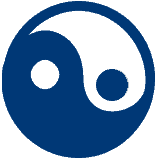
—Wendy Smith
Question:
What do you study, and what led you into this field?
Answer:
I study how people manage ongoing persistent competing demands–tensions between work and life, being collaborative or being competitive, acting authentically or trying on new identities, getting big projects done or dealing with daily administrative tasks. In organizations, leaders need to address competing demands between performing effectively today while experimenting with new opportunities for tomorrow, or between being financially successful while addressing broader social, ethical and environmental concerns.
What we find in our research is that these competing demands are paradoxi- cal–while they are contradictory and oppositional, they are also interdependent and synergistic. For example, our success at work impacts our lives and vice versa.
Traditional approaches suggest that effective decision-making involves thinking through a difficult decision, weighing the pros and cons of alternative options, making a clear choice. As professors, we teach our students how to collect and analyze data to make better choices. And then we like when people are consistent and stick with their choices. We believe that leaders who change their positions are “flip-floppers” or “wishy-washy.”
However, in our research we find that this kind of either/or thinking to try to choose between competing demands can actually be a detriment. Instead, a both/and approach to these tensions can lead to novel, creative and more sustainable outcomes. Yet, we also know that adopting this kind of an approach is really difficult for individuals as well as leaders of organizations.
I probably began exploring this notion of paradox because it spoke to me personally as I confronted my own competing demands in my career (be an academic or be a practitioner), my research (study organizations or study individuals) and my life (focus on my career or focus on my family), and how I often felt stuck and unsatisfied with the either/or choices as I experienced them.
Question:
Did you color outside the lines as a kid?
Answer:
Lines … what lines? As a kid, I was always much happier drawing on a plain white sheet of paper than in a coloring book.
Question:
Can you recount the tipping point—the idea that produced your ‘aha!’ moment?
Answer:
Ben and Jerry’s!
Before starting my Ph.D., I briefly worked as a management consultant. I was intrigued by the concept of social responsibility. I remember sitting in a Portuguese restaurant in Newark, New Jersey, while my team leaders patronizingly told me the concept of social responsibility was idealistic, but limited. But the collapse of Enron as well as several other large corporations in the late 1990s demonstrated what happens if organizations focus ONLY on profit.
Ben and Jerry’s and the organizations that followed that comprise Businesses for Social Responsibility, or all the organizations like B-Corporations that are changing legal structures to allow organizations to pay attention to a double and triple bottom line, demonstrate sustainable pathways to integrate profits and purpose. If we can bring together profits and purpose in a single organization, we can integrate all kinds of paradoxical tensions in our lives.
Question:
Were there many naysayers and how did you navigate that?
Answer:
LOTS of naysayers! As a Ph.D. student, I wanted to study paradox, especially in the context of social responsibility. Academics told me “paradox” belonged in a yoga study or a meditation session, not in academic journals. Others told me I would never get a job as a business school academic if I focused on social responsibility. I guess I was too naïve to listen.
There is a point where their feedback was right. While I did get a job, it took me a long time to be able to publish these ideas and share them broadly in the way I wanted to. That said, I was also able to navigate some of the naysayers by listening carefully to their arguments and thinking about how to better articulate mine. I spent a lot of time with forward-thinking individuals and executives to learn what they thought. I also surrounded myself with people who shared my ideas and could continue to help me think through and advance them—many became long-term collaborators and academic mentors. Finally, I worked to build a community of like-minded individuals about paradox to help support one another.
Question:
Did anyone in particular inspire you to think differently?
Answer:
My Ph.D. adviser once told me, “I know I have a good idea when lots of people resist it.” That statement helped me see the resistance to my own ideas as a source of strength and something I could learn from, rather than as something to stop me from what I was doing.
Question:
What has been most satisfying about your work? Most terrifying?
Answer:
I am currently most satisfied when someone tells me how the ideas of paradox and both/and thinking enable them to reframe a challenge and help them to become unstuck, more creative or more satisfied. I find it rewarding to share ideas of paradox and both/and thinking with senior leaders and see the impact on their organizations. I find it rewarding to share these ideas in one-on-one conversations with friends and colleagues to help them think differently about situations they face. Perhaps I find it most rewarding — and most terrifying — when someone calls me out on my either/or thinking and challenges me to adopt a more both/and perspective to my own competing demands.
Question:
What is your favorite problem at the moment?
Answer:
Our economic system is one of the most important challenges we face at the moment. Capitalism advances growth, novelty and innovation, but has done so toward the goal of individual achievement, rather than collective growth and improved universal welfare. As a result, we have consolidated economic, political and social power in the hands of a very small number of people, who do not and cannot address the diverse needs of a broader society. If we are to improve our global welfare, we have to rethink our economic systems so that they can motivate growth, novelty and innovation toward the advancement of, rather than to the detriment of, collective success and improved social conditions. I’m intrigued about what that kind of system looks like and how we can get there.
Question:
Does your disruptive side prove challenging at home?
Answer:
I have 12-year-old twins. Both/and thinking can be really helpful at home.
Question:
Why do you want to keep doing this work?
Answer:
The potential to make a positive impact on our global welfare.
MORE STORIES
From the Vice President for Research, Scholarship and Innovation
A disruptor prevents things from proceeding as usual. But that’s not always bad. In research and education, we’re always turning ideas and methods on their ear in the quest to learn something new…
Innovation In Motion
UD researchers partner with Reebok to build a “smart” sports bra — a sports bra engineered to actually do its job!
Disruptors
This issue of the University of Delaware Research magazine puts new faces on this idea of disruption, highlighting the innovative way our researchers are tackling complex problems. Learn about their work and what drives them and how the disruption they cause can produce real benefit for our world.
Bright Star
UD’s Science, Technology and Advanced Research (STAR) Campus is shining ever brighter with the nationally recognized Tower at STAR.
Test Your Knowledge: Innovation
As a growing research institution, the University of Delaware is a place where you’ll find new ideas constantly sparking solutions to challenges once deemed impossible.The wonder of innovation is all around us, but what do you really know about it? Try your hand at these questions.
Art In Science
Now in its fourth year, this annual exhibit offers a captivating glimpse into a vast world of discovery at the University of Delaware.
The Baltimore Collection
Something truly special emerged from a box that no one expected until Julie McGee, associate professor of Africana Studies and Art History, and her University of Delaware students got their hands on the 53 photographs inside.
Disruptors: Defending Equal Access to Food
How does a new supermarket impact people who live nearby? Can healthy options be found in the little store down the street? These are questions that Allison Karpyn ponders regularly.
Disruptors: Cracking a Cell’s Secret Code
Jason Gleghorn has held a variety of jobs since college—teacher, firefighter, medic, engineer. Today, he’s an interpreter of sorts, too, deciphering the language that cells use to communicate in hopes of advancing new treatments for congenital birth defects, pediatric diseases and more.
Disruptors: Making Our Way
Professor of Africana studies at UD and an ordained elder in the African Methodist Episcopal Church, Monica A. Coleman focuses on the role of faith in addressing critical social and philosophical issues.
Disruptors: Moving Forward with Autism
With skills in physical therapy, behavioral neuroscience and biomechanics, Anjana Bhat brings expansive expertise to her work developing creative therapies for those living with autism spectrum disorders.
Disruptors: Expanding Our World View
These co-founders of the Robotic Discovery Laboratories in UD’s College of Earth, Ocean and Environment manage a growing robotics fleet for use on land, in air and under the sea. They explore questions along the coast, at the poles and in deep regions of the ocean.
Disruptors: Harnessing Beneficial Microbes
So, what do a virologist, botanist and soil physicist have in common? This team from UD’s College of Agriculture and Natural Resources is leveraging their collective expertise to ensure that our food supply is safe and abundant, now and in the future.
Honors
UD researchers have been recognized recently by the National Institutes of Health, American Political Science Association, TED Fellows program, National Science Foundation, National Academy of Inventors and the Gates Cambridge Scholarship program.
News Briefs
Check out some recent developments, from the launching of major research programs to address environmental and health issues in the First State, to the preservation of a pair of 1909 mittens with a hallowed history.
CONTACT
Tracey Bryant
Senior Director, Research Communications
Email: tbryant@UDel.Edu
SUBSCRIBE & CONNECT
The University of Delaware Research magazine showcases the discoveries, inventions and excellence of UD’s faculty, staff and students. Sign up for a free subscription.



